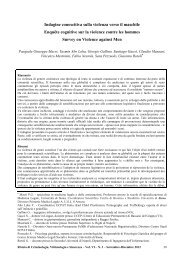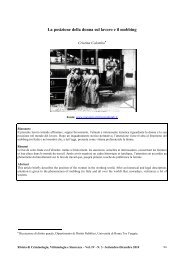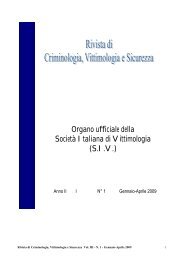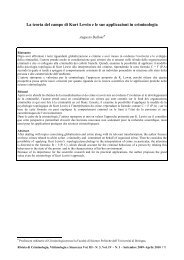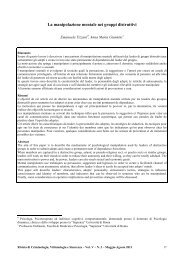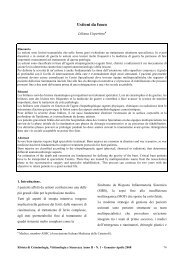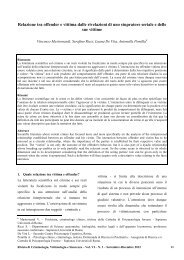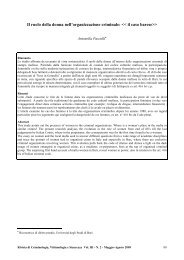Globalization, Transnational Crime and State Power ... - Vittimologia
Globalization, Transnational Crime and State Power ... - Vittimologia
Globalization, Transnational Crime and State Power ... - Vittimologia
Create successful ePaper yourself
Turn your PDF publications into a flip-book with our unique Google optimized e-Paper software.
country because it relieves unemployment <strong>and</strong>,<br />
with the remittances, it fuels their economy.<br />
Employers (<strong>and</strong> they are not any more just<br />
Western employers) appreciate the cut-rate labor<br />
provided <strong>and</strong> the submissive position of<br />
undocumented workers that can be dismissed at<br />
will <strong>and</strong> actually turned over to the authorities for<br />
repatriation, if they make too many dem<strong>and</strong>s. The<br />
family or villages that pooled their money to send<br />
a worker abroad also like it, because the<br />
investment is returning dividends.<br />
This financial link may at times influence a<br />
government to turn a blind eye or to not enforce<br />
the law against human trafficking too zealously<br />
because of the obvious financial benefit to be<br />
derived 52 . Some countries are suspected of<br />
funding NGOs supposedly working in the<br />
problem area -- trafficking of women, children,<br />
people in general - with the actual m<strong>and</strong>ate of<br />
projecting a positive image of the government as<br />
if it is making major strides to resolve the<br />
problem. At times, if especially needed, powerful<br />
<strong>and</strong> professional lobbyists are hired to stave off<br />
criticism <strong>and</strong> sanctions. But we are not talking<br />
here necessarily of overt corruption or of open<br />
approval. The support can be quiet <strong>and</strong> even tacit<br />
but it thwarts any serious effort to stop the<br />
trafficking of human beings, 53 especially women<br />
<strong>and</strong> children, for sexual exploitation, <strong>and</strong> of<br />
laborers for factories <strong>and</strong> for the agricultural,<br />
tourism, <strong>and</strong> the unskilled services sectors of the<br />
51 remesasydesarrollo.org/<br />
52 A.l Schwartz, “Sex Trafficking in<br />
Cambodia”, Colum. J. Asian L., Spring 2004, 17, 371;<br />
G. Chang, “The Global Trade in Filipina Workers”, in<br />
S. Shah (ed.), Dragon Ladies: Asian American<br />
Feminists Breathe Fire, 1997, 132, 135.<br />
53 I. Wolffers, Migration, human rights, <strong>and</strong> health,<br />
New York, Elsevier, 2003.<br />
economy of the receiving country 54 . The<br />
agricultural, farming, tourism, restaurants, <strong>and</strong><br />
hotels sectors are often those most strongly<br />
opposed to a meaningful reform of immigration<br />
laws, 55<br />
especially amnesties <strong>and</strong> regularizing<br />
undocumented immigrants. These sectors of the<br />
economy earn more money <strong>and</strong> exercise much<br />
more control when dealing with a vast pool of<br />
undocumented, unskilled, eager, if not desperate,<br />
compliant, competing, highly disposable <strong>and</strong><br />
cheap workers than with legal immigrants who<br />
have a better chance of possibly enforcing their<br />
rights, earn at least minimum wage, maybe belong<br />
to a union, <strong>and</strong> have some st<strong>and</strong>ing when<br />
expecting the protection of the law <strong>and</strong> of the<br />
authorities 56 . At times these situations are also<br />
created through the illogical aspects of<br />
globalization. For example, the European Union<br />
has a labor shortage <strong>and</strong> an aging population that<br />
is not being replenished because of low birthrates.<br />
At the same time, restrictive immigration policies<br />
remain in force <strong>and</strong> are actually just now being<br />
tightened 57 . The result? Another wide<br />
opportunity, almost an open invitation, for<br />
54 B. Crossette, “UN Warns that Trafficking in Human<br />
Beings is Growing”, N.Y. Times, June 25, 2000, at<br />
A10. Trafficking in children has also increased. The<br />
Center for Protection of Children's Rights estimates<br />
that as many as 800,000 children worldwide are in<br />
prostitution. In India alone, UNICEF estimates that<br />
there are approximately 400,000 to 500,000 child<br />
prostitutes. Manuel Castells, End of Millennium 155<br />
(1998).<br />
55 18 th Annual Corporate Law Symposium: David<br />
Weissbrodt, Corporate social responsibility in the<br />
international context: Business <strong>and</strong> Human Rights,<br />
Fall, 2005, 74 U. Cin. L. Rev. 55.<br />
56 L. Cata Backer, “Multinational Corporations,<br />
transnational law: The United Nations’ norms on the<br />
responsibilities of transnational corporations as a<br />
harbinger of corporate social responsibility in<br />
international law”, Colum. Human Rights L. Rev.,<br />
Winter 2006, 37, 287.<br />
Rivista di Criminologia, <strong>Vittimologia</strong> e Sicurezza Vol. III - N. 3, Vol. IV – N. 1 – Settembre 2009–Aprile 2010 74



